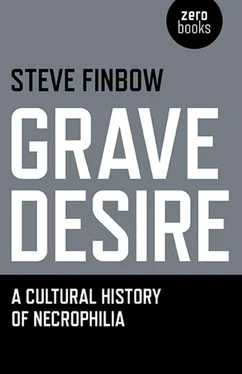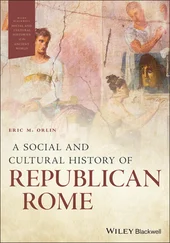There have been reports of, and YouTube videos to illustrate, necrophilia in mallard ducks, penguins, dogs, cats and toads. Websites such as Girls And Corpses mix morbid humour with scantily clad women, describing itself as ‘Maxim Magazine meets Dawn Of The Dead.’ A Japanese otaku website, the Sankaku Complex, specializes in anime, porn and dolls, and has designated necrophilia pages. Forums such as Goreology discuss necrophilia and posts photos and videos of dead bodies in various states of decay and mutilation. On the website Crime Scene Photos can be found images of the victims of Jack the Ripper (not a known necrophile), Ted Bundy, Ed Gein, Jerry Brudos, Andrei Chikatilo and, to this viewer, most shockingly, two young men murdered and mutilated by Jeffrey Dahmer. Necrophilia appears on television in programmes such as Irvine Welsh’s Wedding Belles, Family Guy, Criminal Minds, Nip/Tuck, the CSI franchise and in the movies Freddy vs. Jason, Weekend At Bernie’s, Clerks and Quills (about de Sade). From the above list it is apparent that necrophilia is treated as an investigative forensic subject, as a platform for morbid humour or as a means to shock the viewer. Irvine Welsh uses necrophilia to shock us, disgust us but also to make us laugh.
There was nothing like the sight of a stiff to give Freddy Royle a stiffie.
-Bit bashed about this one, Glen, the path lab technician explained, as he wheeled the body into the hospital mortuary.
Freddy was finding it hard to maintain steady breathing. He examined the corpse.
-She’s bain a roight pretty un n arl, he rasped in his Somerset drawl,◦– caar accident oi presumes?
-Yeah, poor cow. M25. Lost too much blood by the time they cut her out of the pile-up, Glen mumbled uncomfortably. He was feeling a bit sick. Usually a stiff was just a stiff to him, and he had seen them in all conditions. Sometimes though, when it was someone young, or someone whose beauty could still be evidenced from the three-dimensional photograph of flesh they had left behind, the sense of the waste and futility of it all just fazed him. This was such an occasion.
One of the dead girl’s legs was lacerated to the bone. Freddy ran his hand up the perfect one. It felt smooth.◦– Still a bit wahrm n arl, he observed,◦– bit too waarm for moi tastes if the truth be told. [273] Irvine Welsh, Ecstasy: Three Tales of Chemical Romance, (London, 1996), p. 8.
The taboo makes us reacts with laughter or disgust, a pornography of bodily functions and response.
There are many cases that have not been discussed because of the similarity of the acts to other acts documented or the lack of evidence that necrophilia actually occurred. And, again, these necrophiliac acts range from the frottage of 18-year-old Alisa Massaro who, it was claimed in 2013, along with two of her sexual partners strangled two men in order for her to be able to lie on top of them, ala Karen Greenlee, and bring herself to orgasm. Or that of a Michigan pastor who killed his fiancee’s daughter in 2012 to realize his necrophiliac fantasies. Or the Egyptian court, which in 2012 introduced a bill legalizing “farewell intercourse” so that men could have sex with their dead wives for up to six hours after their death. It is also evident that necrophilia is a worldwide phenomenon, Thor Nis Christiansen (Danish), Roderick Jones (American), Lam Kor-wan (Chinese), Issei Sagawa (Japanese), Moninder Singh Pandher and Surendra Koli (Indian), Andrei Chikatilo (Russian), Serhiy Tkach (Ukrainian) and Eli Ulayuk (Inuit). All homicidal or regular necrophiles, and some, like Chikatilo who indulged in necrophilia as part of his lust murders. But it is with a study of a Frenchman, Nico Claux, that I will conclude this book on necrophilia and necrophiles.
Nico Claux [274] Information on Nico Claux can be found here: http://web.archive.org/web/20070627053657/www.nicolasclaux.com/ and http://murderpedia.org/male.C/c/claux-nicolas.htm
shared many similarities with Sergeant Bertrand, Ted Bundy and Jeffrey Dahmer. After his arrest in November 1994 on suspicion of being a serial killer who targeted gay men, police discovered vertebrae and bones used as everyday and art objects in his apartment. As in the case of Miyakazki, the detectives also found videos of horror and sadomasochistic movies. Like Dahmer, Claux kept bags of blood in his fridge and hardcore porn magazine on his bookshelves. Unlike Dahmer, Claux had not collected the blood from his victims but, like so many other necrophiles, had worked as a mortuary assistant and had collected the blood from the morgue. He had necrophiliac and cannibalistic fantasies and had had stolen bones from several Paris cemeteries and had cut strips of flesh from the bodies in the morgue to cook and eat. ‘Sacrifice replaces the ordered life of the animal with a blind convulsion of its organs. So also with the erotic convulsion; it gives free rein to extravagant organs whose blind activity goes on beyond the considered will of the lovers. Their considered will is followed by the animal activity of these swollen organs. They are animated by a violence outside the control of reason to yield to the breaking storm.’ [275] Erotism, p. 92.
Police were suspicious of Claux’s testimony, believing him to be a fantasist with an obsession with vampires and pornography. Born in Cameroon to French parents, Claux, like many serial killers, was an only child whose parents showed little or no love towards him. The family moved from Cameroon to London and then to France and the solitary boy became interested in vampires, werewolves, zombies and the occult, and death became an obsession after his grandfather died from a cerebral embolism while he was present. The actual death of his grandfather merged with the cult of death the 10-year-old Claux had created and he began to attend wakes and habituate cemeteries and mortuaries. ‘But places are dead bodies: their spaces, their tombs, their extended masses, and our bodies coming and going among them, among ourselves.’ [276] Jean-Luc Nancy, Corpus, trans. Richard A. Rand (New York, 2008), p. 121.
Because the family moved regularly, Claux found it difficult to make friends, his obsession with death could not have helped, and he became more insular and isolated and here the ‘germs of perversion’ [277] The Psychology of Love, p. 47.
and ‘infantile seeds of perversion’ [278] The Psychology of Love, p. 101.
began, along with a feeling of hatred for other people. At the age of 16, the family returned to Paris and Claux began frequenting the same cemeteries in which Sergeant Bertrand had disinterred, mutilated and ravaged corpses—Montparnasse and Père Lachaise among others. Here death and sex are united in a ‘twofold evolution tend[ing] to make the flesh into the root of all evil, shifting the most important moment of transgression from the act itself to the stirrings—so difficult to perceive and formulate—of desire.’ [279] The History of Sexuality, p. 19.
Claux began to break into mausoleums and tombs using homemade locks and picks. Once inside, he felt powerful, in charge, the king of the dead, a sadistic despot of corpses.
‘What is a criminal after all? A criminal is someone who breaks the pact, who breaks it from time to time whenever he needs or wants to, when his interest dictates, when in a moment of violence or blindness the motive of his interest prevails despite the most elementary rational calculation. The criminal is a temporary despot, a despot of the moment, through blindness, fantasy, passion, or whatever. By contrast, the despot asserts the predominance of his interest and will; he makes it prevail permanently. The despot is a criminal by his status whereas the criminal is a despot by accident. When I say by status I am exaggerating because the despot cannot have any status in society. The despot can promote his will over the entire social body only through a permanent state of violence. The despot is therefore someone who—beyond status and the law, but in a way that is completely bound up with his very existence—permanently exercises and advances his interest in a criminal way. The despot is the permanent outlaw, the individual without social ties. The despot is the man alone. [280] Michel Foucault, Abnormal: Lectures at the College de France 1974-1975, trans. Graham Burchell (London, 2003), p. 94.
Читать дальше












